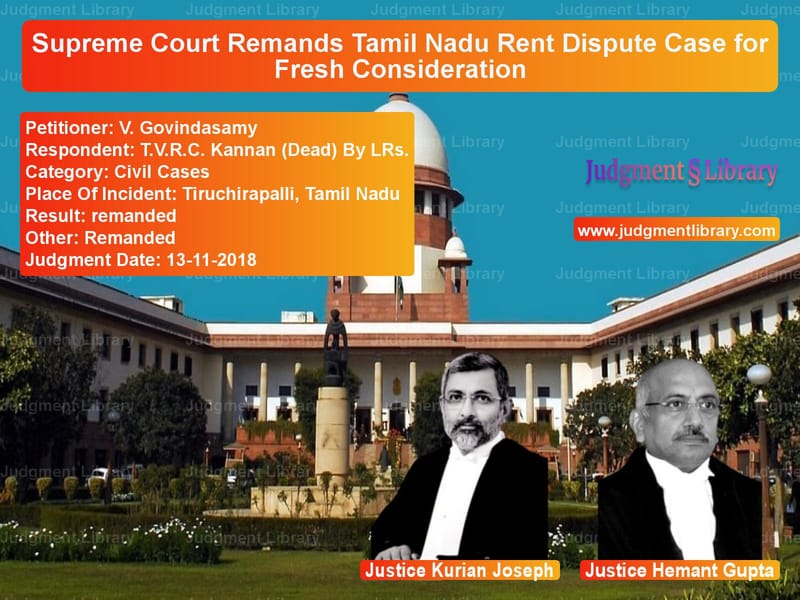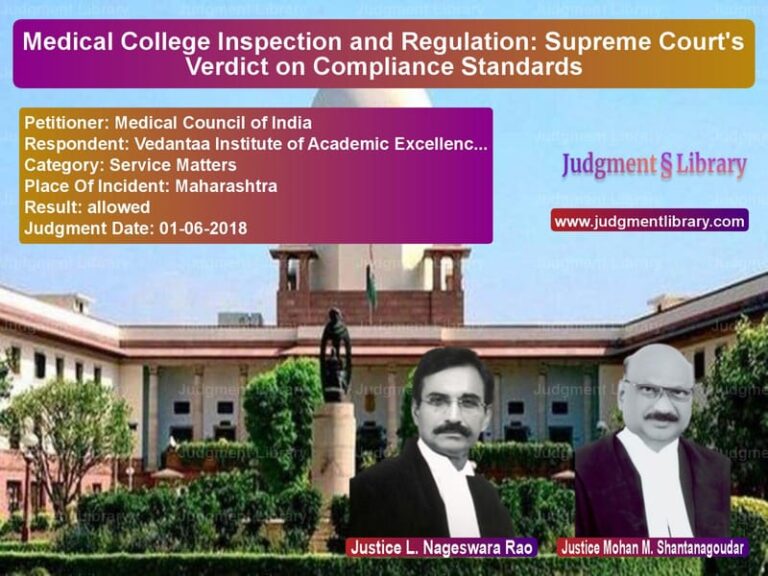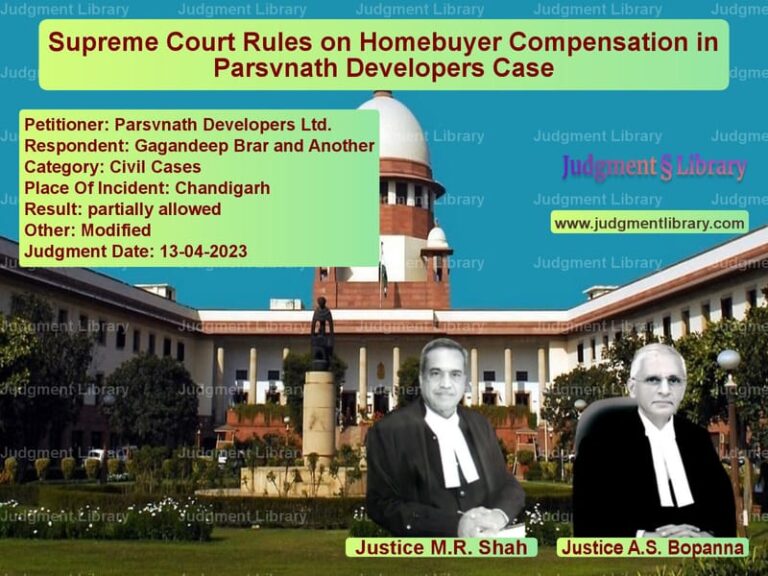Supreme Court Remands Tamil Nadu Rent Dispute Case for Fresh Consideration
The case of V. Govindasamy vs. T.V.R.C. Kannan (Dead) By LRs. revolves around a long-standing rent dispute in Tamil Nadu. The Supreme Court was tasked with reviewing whether the eviction order passed by the Rent Controller and subsequently upheld by the appellate authorities and the High Court was justified. The key legal issue pertained to an order passed under Section 11(4) of the Tamil Nadu Buildings (Lease and Rent Control) Act, 1960.
After reviewing the matter, the Supreme Court set aside the previous orders and remanded the case to the Rent Controller, Tiruchirapalli, for reconsideration on merits. The Court further directed the Rent Controller to issue fresh notices to all parties and dispose of the case expeditiously.
Background of the Case
The dispute originated from an order passed by the Rent Controller, Tiruchirapalli, under Section 11(4) of the Tamil Nadu Buildings (Lease and Rent Control) Act, 1960. This section relates to eviction proceedings initiated due to alleged arrears in rent payment.
The appellant, V. Govindasamy, was ordered to vacate the premises on account of rent arrears. However, he contended that he had cleared all dues and sought to contest the eviction proceedings on their merits.
The eviction order was subsequently upheld by the Appellate Court and the High Court, leading the appellant to file an appeal before the Supreme Court.
Arguments by the Petitioner (V. Govindasamy)
- The eviction order under Section 11(4) was unjustified as all arrears of rent had been cleared.
- The courts below had not properly considered whether the grounds for eviction under Section 10(2) of the Tamil Nadu Buildings (Lease and Rent Control) Act were satisfied.
- Eviction proceedings should be decided based on substantive merits rather than procedural technicalities.
- The case should be remanded for fresh adjudication, allowing a fair opportunity for defense.
Arguments by the Respondents
- The eviction order was lawfully passed as the tenant had failed to pay rent on time.
- Even if arrears had been subsequently cleared, the initial default was sufficient to warrant eviction under the law.
- The orders passed by the Rent Controller, Appellate Court, and the High Court were legally sound and should not be interfered with.
Supreme Court’s Judgment
The Supreme Court set aside all previous orders and remanded the case to the Rent Controller, Tiruchirapalli, for fresh adjudication. The key rulings of the Court were:
- The matter should be considered afresh on its merits, without being influenced by the prior eviction order under Section 11(4).
- The Rent Controller should issue fresh notices to all parties and proceed with the case accordingly.
- “Since the impugned order is passed under Section 11(4), we are of the view that the main petition filed under Section 10(2) of the Act for eviction has to be considered on merits.”
- Given that the case had been pending since 1991, the Rent Controller was directed to dispose of it expeditiously, within three months from the first date of hearing.
The Court observed:
“We set aside the impugned orders passed by the Rent Controller, Tiruchirapalli, the Appellate Court, and the High Court and remit the Rent Control Petition to the Rent Controller, Tiruchirapalli for consideration on merits.”
Implementation of the Judgment
The Supreme Court directed the following steps to be taken:
- The Rent Controller, Tiruchirapalli, must issue fresh notices to all concerned parties.
- The case must be heard and decided strictly on its merits, without reliance on the prior eviction order.
- The matter must be disposed of within three months from the first date of hearing.
Significance of the Judgment
This judgment reinforces the principle that eviction proceedings should be determined on substantive grounds rather than technical orders issued under procedural provisions such as Section 11(4). By remanding the matter, the Supreme Court ensured that the tenant’s defense was adequately heard and that justice was served.
The ruling also highlights the importance of timely adjudication in rent control matters, as the case had been pending for nearly three decades. The Court’s directive for an expedited resolution sets an important precedent for similar cases.
Conclusion
The Supreme Court’s decision in this case ensures that eviction proceedings are determined fairly and in accordance with substantive law. By remanding the case for fresh consideration, the Court upheld the tenant’s right to defend against eviction on its merits.
This ruling serves as a guiding precedent in rent control disputes, emphasizing that eviction should not be granted solely based on procedural defaults if the substantive grounds remain unproven.
Petitioner Name: V. Govindasamy.Respondent Name: T.V.R.C. Kannan (Dead) By LRs..Judgment By: Justice Kurian Joseph, Justice Hemant Gupta.Place Of Incident: Tiruchirapalli, Tamil Nadu.Judgment Date: 13-11-2018.
Don’t miss out on the full details! Download the complete judgment in PDF format below and gain valuable insights instantly!
Download Judgment: V. Govindasamy vs T.V.R.C. Kannan (Dea Supreme Court of India Judgment Dated 13-11-2018.pdf
Direct Downlaod Judgment: Direct downlaod this Judgment
See all petitions in Property Disputes
See all petitions in Landlord-Tenant Disputes
See all petitions in Specific Performance
See all petitions in Judgment by Kurian Joseph
See all petitions in Judgment by Hemant Gupta
See all petitions in Remanded
See all petitions in Remanded
See all petitions in supreme court of India judgments November 2018
See all petitions in 2018 judgments
See all posts in Civil Cases Category
See all allowed petitions in Civil Cases Category
See all Dismissed petitions in Civil Cases Category
See all partially allowed petitions in Civil Cases Category







